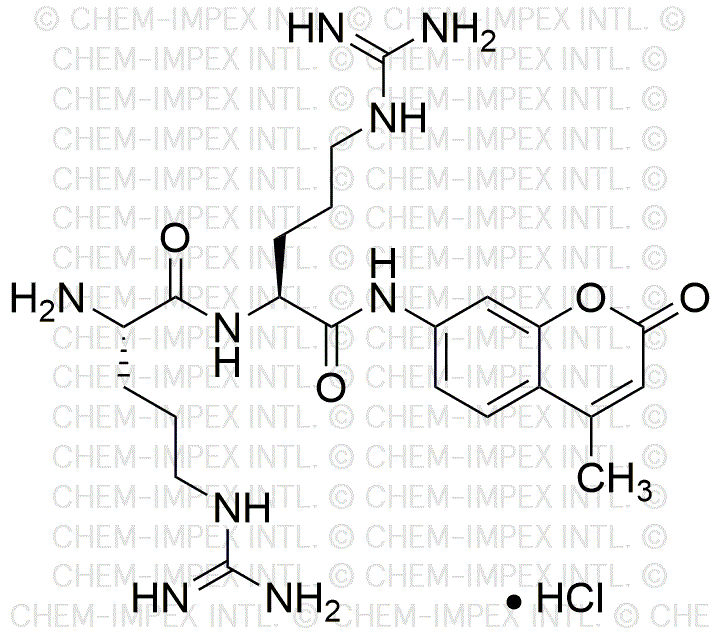H-Arg-Arg-AMC hydrochloride salt is widely utilized in research focused on:
- Protease Activity Assays: This compound serves as a substrate in assays to measure the activity of proteolytic enzymes, helping researchers understand enzyme kinetics and mechanisms.
- Drug Development: It is used in the screening of potential drug candidates, particularly in the development of therapeutics targeting proteases, which play a crucial role in various diseases.
- Biochemical Research: The compound aids in studying protein interactions and modifications, providing insights into cellular processes and signaling pathways.
- Diagnostic Applications: H-Arg-Arg-AMC hydrochloride salt can be utilized in diagnostic tests to detect protease-related diseases, offering a reliable method for early diagnosis.
- Academic Research: It is commonly used in academic laboratories for teaching purposes, allowing students to gain hands-on experience with enzyme assays and protein chemistry.
General Information
Properties
Safety and Regulations
Applications
H-Arg-Arg-AMC hydrochloride salt is widely utilized in research focused on:
- Protease Activity Assays: This compound serves as a substrate in assays to measure the activity of proteolytic enzymes, helping researchers understand enzyme kinetics and mechanisms.
- Drug Development: It is used in the screening of potential drug candidates, particularly in the development of therapeutics targeting proteases, which play a crucial role in various diseases.
- Biochemical Research: The compound aids in studying protein interactions and modifications, providing insights into cellular processes and signaling pathways.
- Diagnostic Applications: H-Arg-Arg-AMC hydrochloride salt can be utilized in diagnostic tests to detect protease-related diseases, offering a reliable method for early diagnosis.
- Academic Research: It is commonly used in academic laboratories for teaching purposes, allowing students to gain hands-on experience with enzyme assays and protein chemistry.
Documents
Safety Data Sheets (SDS)
The SDS provides comprehensive safety information on handling, storage, and disposal of the product.
Product Specification (PS)
The PS provides a comprehensive breakdown of the product’s properties, including chemical composition, physical state, purity, and storage requirements. It also details acceptable quality ranges and the product's intended applications.
Certificates of Analysis (COA)
Search for Certificates of Analysis (COA) by entering the products Lot Number. Lot and Batch Numbers can be found on a product’s label following the words ‘Lot’ or ‘Batch’.
*Catalog Number
*Lot Number
Certificates Of Origin (COO)
This COO confirms the country where the product was manufactured, and also details the materials and components used in it and whether it is derived from natural, synthetic, or other specific sources. This certificate may be required for customs, trade, and regulatory compliance.
*Catalog Number
*Lot Number
Safety Data Sheets (SDS)
The SDS provides comprehensive safety information on handling, storage, and disposal of the product.
DownloadProduct Specification (PS)
The PS provides a comprehensive breakdown of the product’s properties, including chemical composition, physical state, purity, and storage requirements. It also details acceptable quality ranges and the product's intended applications.
DownloadCertificates of Analysis (COA)
Search for Certificates of Analysis (COA) by entering the products Lot Number. Lot and Batch Numbers can be found on a product’s label following the words ‘Lot’ or ‘Batch’.
*Catalog Number
*Lot Number
Certificates Of Origin (COO)
This COO confirms the country where the product was manufactured, and also details the materials and components used in it and whether it is derived from natural, synthetic, or other specific sources. This certificate may be required for customs, trade, and regulatory compliance.


